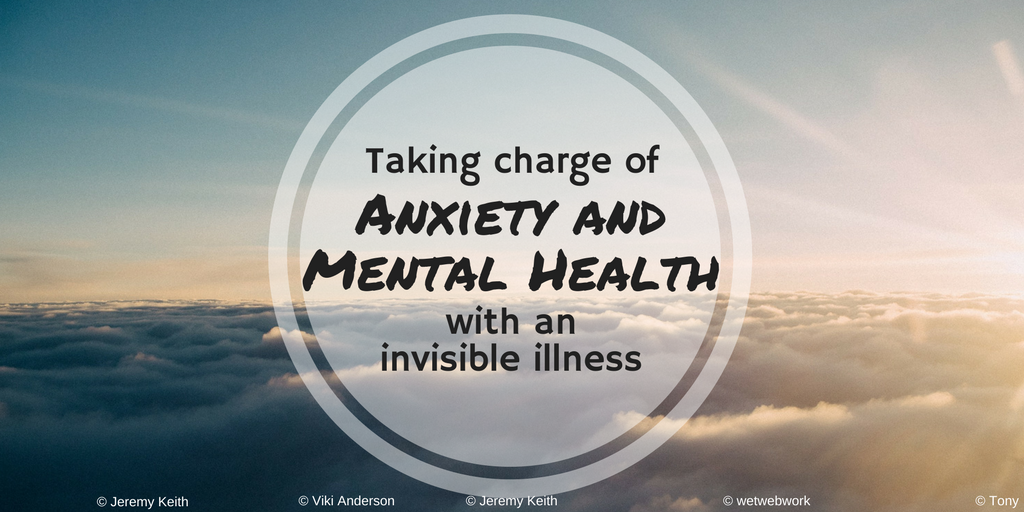
Mental health and coping with anxiety affects everyone, and if you are suffering from an invisible illness it can be even more difficult. It’s #mentalhealthweek so here are some tools for looking after your emotional and mental health when dealing with chronic illness, whether it be IBD, IBS, CFS, ME or other fatigue/auto-immune conditions.
How can we deal with anxiety and invisible illness?
Since many patients feel stress can trigger their symptoms, it is vital to try to get a handle on anxiety. It has been suggested that support for this should be part of Inflammatory Bowel Disease (IBD) patients’ care plans, yet currently only 12 per cent of IBD clinics offer this. Therefore, it is clearly an area where more medical services need to be directed. As I discussed in Chapter 1, initial consultations after being diagnosed can lead to the patient being overwhelmed with information and having a variety of leaflets thrust into their hands about the disease they can only take in later. But where’s the leaflet that tells us how to cope with the associated emotions? The leaflet that gives us ways of not breaking down, and staying strong? The leaflet that offers support groups and websites?
Hopefully the studies I have cited have highlighted the growing link between mental health and IBD. Of course, if you feel you are struggling with anxiety and depression it is vital you speak to your GP urgently. If you have done this and are looking for some self-help suggestions to deal with times of worry and help manage your anxiety, then the guidance below from Sally Baker – a therapist who works specifically with the mind-body connection – may be beneficial. (It is important to be aware at the same time that these tips offer general guidance which cannot replace the individual advice of a medical professional and if you are feeling any new symptoms of anxiety and depression, then it is very important to see your GP.)
Advice from Sally
When Sally works with clients living with chronic ill-health she recognises how having little or no confidence in how one will physically feel from day to day encourages self-doubt and frustration. As you are probably aware, feeling negative about yourself can create a vicious circle of frustration, disappointment and anger. One of the first therapeutic approaches she suggests to break this cycle of negative self-thinking is to encourage patients to gain an enhanced level of self-awareness to highlight the impact those uncomfortable emotions have on them.
She has found one of the most beneficial ways of discovering if a person is prone to negative thoughts about themselves is to explore the kind of things their inner voice says to them. If on reading this your response is, ‘What inner voice? – I don’t have one!’ then that is your inner voice.
Your inner voice runs an almost continuous internal dialogue commenting on everything you do and often makes judgements on how well you do it too. Happening as it does just below conscious awareness, one’s inner voice goes unchecked, and unchallenged, for most of the time.
For many people, especially those living with chronic illness, their inner voice is rarely a source of uplifting encouragement. It is more likely to give an unremitting flow of self-criticism, and negative self-judgements (everything from ‘I hate my body’ to ‘What am I doing wrong?’). Taking the time to become aware of how your inner voice speaks to you can accurately demonstrate to you your own level of self-judgement and self-condemnation. Tuning in, and clearly hearing your inner voice, is the crucial first step to silencing the draining and dispiriting stream of negativity that can hinder moving forward and making positive changes. Sally suggests spending a little quiet time – just a few moments – every day for about a week tuning in to your inner voice, and simply listening and noting down the negative statements. A therapy tool she then uses to resolve those negative, limiting beliefs is called Emotional Freedom Technique (EFT or ‘Tapping’). EFT is an energy therapy that has proved highly effective for revealing true feelings, in this case prompted by one’s negative self-talk.
Once you have a greater awareness of your own negative self-talk you can then apply another of her core therapy tools – called Percussive Suggestion Technique (PSTEC) – to turn-down, or dispel, the emotions attached to the negative beliefs you have about yourself. Turning off negative self-talk is the beginning of a powerful journey which can transform a former inner-critic into your greatest advocate – someone cheering for you instead of undermining you.
This blog is taken from Managing IBD: A balanced guide to inflammatory bowel disease by Jenna Farmer, available as ebook and paperback. For more from Jenna you can follow her blog A Balanced Belly, and for more emotional therapy techniques from Sally Baker check out her book Seven Simple Steps to Stop Emotional Eating.
If you found these tools helpful help us raise awareness of mental health by sharing for #mentalhealthweek
